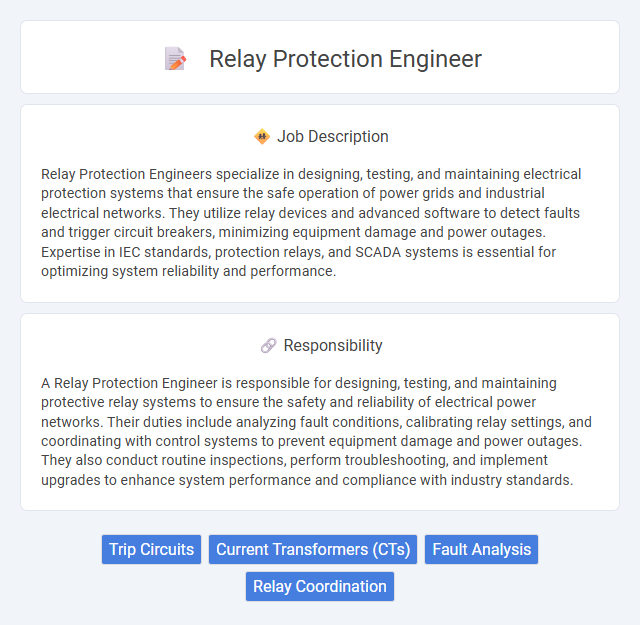
Relay Protection Engineers specialize in designing, testing, and maintaining electrical protection systems that ensure the safe operation of power grids and industrial electrical networks. They utilize relay devices and advanced software to detect faults and trigger circuit breakers, minimizing equipment damage and power outages. Expertise in IEC standards, protection relays, and SCADA systems is essential for optimizing system reliability and performance.
Individuals with strong analytical skills and attention to detail are likely to excel as Relay Protection Engineers, as the role involves diagnosing and resolving complex electrical system faults. People who enjoy working in technically demanding environments and can handle high-pressure situations may find this job well-suited to their abilities. Those with limited interest in electrical systems or discomfort with critical decision-making might struggle to adapt to the responsibilities of this position.
Qualification
A Relay Protection Engineer requires a strong background in electrical engineering, particularly in power systems and protection schemes. Proficiency in using software tools for relay coordination, fault analysis, and system simulation is essential. Industry certifications such as IEC 61850, NERC CIP compliance, and experience with protective relay testing equipment enhance job qualifications.
Responsibility
A Relay Protection Engineer is responsible for designing, testing, and maintaining protective relay systems to ensure the safety and reliability of electrical power networks. Their duties include analyzing fault conditions, calibrating relay settings, and coordinating with control systems to prevent equipment damage and power outages. They also conduct routine inspections, perform troubleshooting, and implement upgrades to enhance system performance and compliance with industry standards.
Benefit
A Relay Protection Engineer is likely to benefit from enhanced career stability due to the critical nature of electrical grid safety and reliability. Opportunities for specialization and advancement might increase as demand for skilled professionals in power system protection rises. Competitive salaries and ongoing professional development are probable advantages linked to this role.
Challenge
A Relay Protection Engineer likely faces complex challenges involving the design, testing, and maintenance of protection systems to ensure electrical network reliability and safety. They probably need to stay updated with evolving industry standards and troubleshoot intricate faults under time-sensitive conditions. The role may require strong analytical skills to optimize system performance while minimizing downtime and preventing equipment damage.
Career Advancement
Relay Protection Engineers specialize in designing and maintaining protection systems for electrical grids, ensuring system reliability and fault detection. Career advancement opportunities include roles like Senior Protection Engineer, Protection Team Lead, and Protection and Control Manager, often requiring expertise in IEC standards, substation automation, and digital relays. Continuous upskilling in smart grid technologies and cybersecurity further enhances prospects for leadership positions and consultancy roles within utility companies or engineering firms.
Key Terms
Trip Circuits
Relay Protection Engineers specialize in designing, testing, and maintaining trip circuits to ensure reliable operation of electrical protection systems. They analyze trip circuit functionality to prevent false tripping and ensure rapid disconnection during faults, enhancing grid stability and equipment safety. Expertise in trip circuit monitoring, fault diagnosis, and coordination with protection relays is critical for minimizing downtime and protecting power system assets.
Current Transformers (CTs)
A Relay Protection Engineer specializes in designing, testing, and maintaining protection systems that use Current Transformers (CTs) to accurately measure electrical currents and safeguard power systems from faults. Expertise in CT ratio selection, accuracy classes, and saturation characteristics is critical for ensuring reliable fault detection and system stability. Proficiency in analyzing CT performance data and integrating CT signals into relay protection schemes optimizes operational safety and system resilience.
Fault Analysis
Relay Protection Engineers specialize in fault analysis to ensure the reliability and safety of electrical power systems. They utilize advanced diagnostic tools and software to identify, locate, and analyze faults within electrical networks, enabling rapid fault clearance and minimizing system downtime. Expertise in relay settings, fault simulation, and system behavior under fault conditions is critical for optimizing protection schemes and preventing equipment damage.
Relay Coordination
A Relay Protection Engineer specializes in designing and implementing relay coordination schemes to ensure selective isolation of electrical faults, minimizing disruption to power systems. They analyze system data, short circuit currents, and relay settings to optimize protection device operation and prevent cascading outages. Expertise in relay coordination enhances the reliability and stability of electrical networks by maintaining accurate fault detection and response times.
 kuljobs.com
kuljobs.com